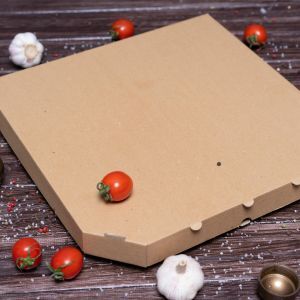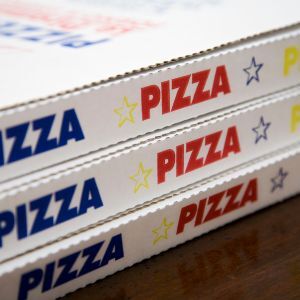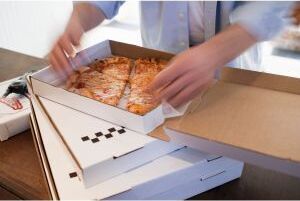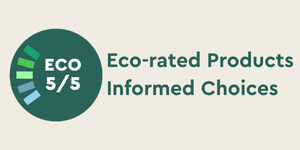Plain vs Printed Pizza Boxes: Which is Better for Your Food Business?
When it comes to pizza box packaging, every detail counts—from cardboard thickness to box size and, importantly, whether your boxes are plain or printed. For New Zealand’s foodservice sector—pizzerias, food trucks, catering services and takeaway shops—this decision affects not only cost but also branding, hygiene compliance, and sustainability.
In this blog, we compare plain vs printed pizza boxes, helping commercial buyers make informed choices about which suits their business, customer experience goals, and operational needs best.
Need help with pizza box thickness or sizing? Read our related guides:
-
Choosing the Right Pizza Box: Why Cardboard Thickness Matters – Read More
-
What Size Pizza Box Do I Need? Slice vs Full Pizza Boxes – Read More
The Case for Plain Pizza Boxes
Advantages:
-
Cost-Effective: Plain boxes are generally cheaper as they skip custom printing setup and ink costs.
-
Fast Turnaround: Since they’re often stock items, they’re readily available and faster to order.
-
Eco-Friendly Options: Easier to recycle or compost, especially if no inks or coatings are used.
-
Versatile: Suitable for a variety of menu items and use cases, not just pizza.
When to Use:
-
New or low-volume food businesses
-
Temporary pop-ups or mobile food stalls
-
Events or venues with sustainability goals
-
When using branded stickers or stamps instead
The Case for Printed Pizza Boxes
Advantages:
-
Brand Visibility: Custom boxes promote your brand every time a customer opens or carries the box.
-
Professional Presentation: Enhances perceived quality and attention to detail.
-
Custom Messaging: Highlight promotions, eco claims, or brand values directly on the packaging.
When to Use:
-
Established food brands or franchises
-
Delivery-heavy operations
-
Businesses with strong local recognition or growth goals
-
Product launches or seasonal campaigns
Cost Comparison: Plain vs Printed Boxes
Feature |
Plain Boxes |
Printed Boxes |
|
Base Cost per Unit |
Lower |
Higher |
|
Setup Costs |
None |
Moderate to High (depending on design) |
|
Lead Time |
Short |
Longer |
|
Customisation |
Limited |
Fully Custom |
|
Minimum Order Quantities |
Low |
Often Higher |
Tip: For smaller businesses, a hybrid approach—plain boxes with custom stamps or stickers—offers branding without the cost of full printing.
Branding & Food Safety Considerations
-
Use food-safe inks that don’t leach under heat or moisture.
-
Avoid printing on interior surfaces or where grease may absorb.
-
Choose water-based or soy inks if aiming for compostability.
-
For hygiene-critical settings, ensure printed boxes meet NZ food contact regulations.
Sustainability: Which is More Eco-Friendly?
Plain boxes usually have the edge here:
-
Fewer inks mean easier recycling or composting.
-
Many printed boxes are recyclable if grease and ink levels are low.
-
Compostable certifications depend on the material and printing method.
FAQ – Printed vs Plain Pizza Boxes
Do printed pizza boxes cost more?
Yes. The unit cost is higher due to design setup, inks, and minimum order requirements. However, it can return value through improved branding.
Are plain boxes better for the environment?
Often yes, especially if they are uncoated and made from recycled or FSC-certified materials.
Can I compost printed pizza boxes?
Some can be composted if printed with food-safe, non-toxic inks and free from heavy grease.
Is it worth printing pizza boxes for small businesses?
If your business has consistent volume and branding matters to your customer experience, then yes. For very small operators, consider alternatives like stickers or stamps.
Final Thoughts
Choosing between plain and printed pizza boxes depends on your brand identity, budget, and customer expectations. While printed boxes offer standout branding opportunities, plain boxes are cost-effective, flexible, and eco-conscious.
At Insinc Products, we offer both plain and printed pizza boxes suitable for New Zealand food businesses of all sizes. Whether you're scaling up or starting out, our team can help you find the right balance of cost, sustainability, and branding.
Get in touch with us today to explore packaging solutions that align with your business goals and food safety requirements.
Posted: Friday 12 September 2025



